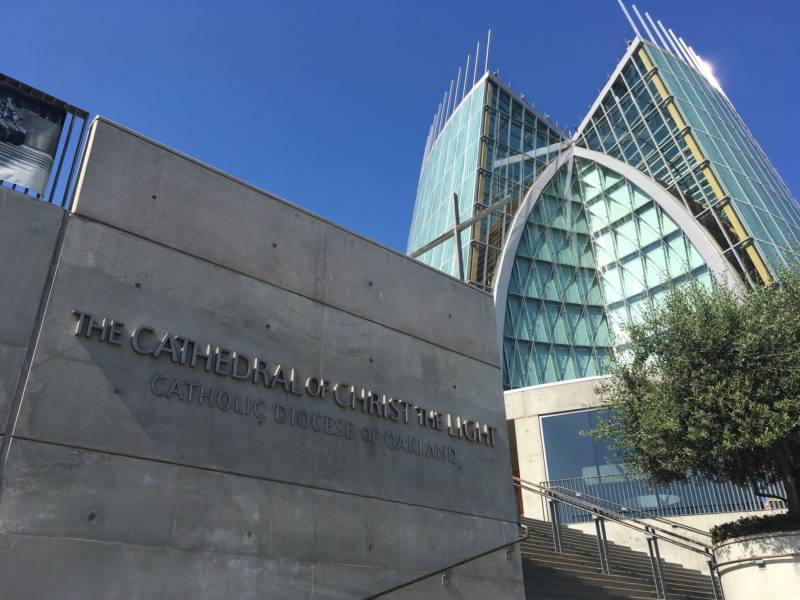Speaker 2 said that as a child, Monsignor John T. McCracken, on several occasions, locked him in the library of St. Mary’s Church in Walnut Creek and molested him.
“He gave me something to drink, pulled my pants down, and I felt a stabbing pain from behind,” he said. “He told me, ‘You’ll go to hell if you tell anyone.’”
Nearly all the speakers on Friday said they were raised by devout Catholic families who worked hard and saved money to send their children to Catholic schools, partly because they thought they would be safer there. And they all described the ongoing harm they suffer because of the abuse.
“I chose not to have children, even though my husband wanted one,” Speaker 3 said. “I couldn’t be touched by men. I will always mourn the children I could have had.”
She went on to say that she is currently battling breast cancer, which she said was not detected early because she had avoided having hands-on medical checkups as a result of the abuse.
Others detailed ongoing problems with substance use, broken marriages, intimacy, weight and self-confidence linked to the abuse.
“I started using and selling hard drugs in 8th grade,” Speaker 7 said, “I was hypersexualized. I’ve had nightmares my entire life.”
In November, the diocese proposed paying 345 abuse claimants between $464,492 and $574,637, with a total payment between $160.25 million and $198.25 million. That $38 million variance hinges on the diocese’s sale of property in Livermore.
However, the committee representing the survivors filed an objection to the payment plan, calling it “inadequate.
“ The Diocese of Oakland needs to look honestly at its financials and its ability to pay and to compensate people that they hurt,” said Stein, the attorney representing some of the survivors. “That amount needs to show that they understand that they made mistakes and want to take ownership and accountability for what happened, not just pay them enough to go away while they continue on with business as usual.”
On Wednesday, Judge Lafferty heard objections from the survivors’ committee but ultimately allowed the diocese’s repayment plan to move forward.
However, he also required the diocese to make revisions to its proposed payment plan based on further scrutiny of its financial disclosures — including a roughly $106 million transfer of funds that it made about 30 days before declaring bankruptcy.
“The court is going to allow the parties to be able to look into their different perspectives and for some of that information to be added to the disclosure statement so that it is better explained to the people who will be voting on the proposed plan,” Stein said.
In a statement last week, Oakland Bishop Michael C. Barber said: “We recognize that no amount of money can satisfactorily compensate survivors for the abuse they suffered. Bearing that in mind, we believe the plan compensates survivors in a fair and equitable way and allows the Diocese of Oakland to set a path forward to continue to spread the Gospel, serving the faithful and the poor.”
In court last Friday, many of the survivors directly appealed to Barber at the end of their statements.
“It’s imperative that the diocese do the right thing and provide just compensation,” Speaker 2 said, facing Barber. “I ask you, ‘What would Jesus do?’”.
After all eight survivors spoke, Barber asked to make a statement of his own, eliciting audible groans and prompting many of the survivors to walk out of the courtroom. Jennifer Stein, the attorney, said some survivors viewed it as “too little, too late.”
“Insincere, opportunistic and inauthentic,” she said. “The words don’t match the actions.”
“The sin of abuse is diametrically opposed to the will of God and must be utterly rejected by those who aspire to follow Christ and serve the members of his body,” Barber said. “For the suffering of each person who has been abused, I offer our deepest unconditional apology.”
Outside court, Cathy Pickard, an abuse survivor who had spoken about her experience in a previous court appearance, said she has carried the trauma of her abuse throughout her life.
“ You find ways to live your life, but you live a lie. Every minute of my life is a lie,” she said. “Until I was able to say what I said, that’s the only time that the truth of who I am comes out.”

